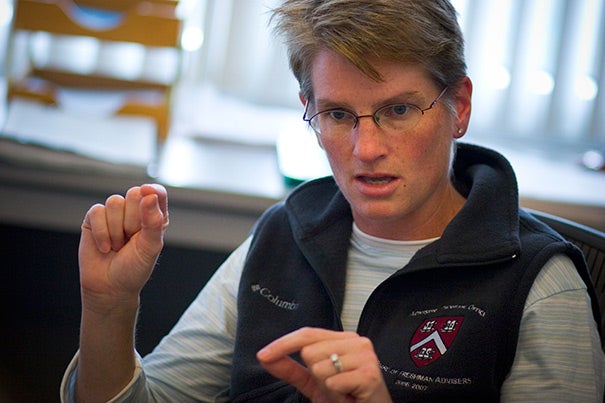
Erin K. O’Shea, the director of the FAS Center for Systems Biology, has been named vice president and chief scientific officer of the Howard Hughes Medical Institute. O’Shea will maintain her lab at Harvard, where her research has focused on the way cells sense changes in their environment and respond appropriately.
File photo Justin Ide/Harvard Staff Photographer
HHMI taps Erin O’Shea
New HHMI VP and chief scientific officer will maintain Harvard lab
Erin K. O’Shea, the director of the Harvard Faculty of Arts and Sciences’ (FAS) Center for Systems Biology and the Paul C. Mangelsdorf Professor of Molecular and Cellular Biology and of Chemistry and Chemical Biology, has accepted the position of vice president and chief scientific officer of the Howard Hughes Medical Institute (HHMI).
“Erin’s passion for science, her scholarship, her breadth of scientific interests, and her exceptional skills as a mentor and teacher make her the ideal person to lead our scientific programs,” HHMI President Robert Tjian said in making the announcement.
At HHMI, O’Shea will oversee a broad scientific portfolio that includes the HHMI Investigator Program, which supports researchers in HHMI laboratories across the United States, as well as programs that support early career scientists; initiatives that foster innovative, collaborative research; and projects that identify new opportunities to capitalize on the institute’s expertise in biomedical research and science education.
She will begin her new duties part time in January and transition to a full-time position in July 2013.
O’Shea, however, won’t be leaving Cambridge completely.
She plans to continue to maintain her lab at Harvard, where her research has focused on the way cells sense changes in their environment and respond appropriately, work that has implications for understanding cancer and other diseases. Although she will no longer teach classes, O’Shea plans to maintain her involvement with faculty and student recruiting in the Molecular and Cellular Biology and Chemistry and Chemical Biology departments, as well as her engagement with the Center for Systems Biology.
“I was attracted to this position because it provides an opportunity to have a positive and lasting influence on research on the national and international level, as well as to work with colleagues to elevate the importance and quality of science education,” she said. “I am delighted and honored to have this opportunity to help oversee HHMI’s research programs. I look forward to the challenge of identifying the most promising scientists and areas of scientific investment, and to maximizing the impact that HHMI has on science, both inside and outside of this country.”




